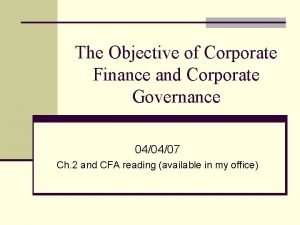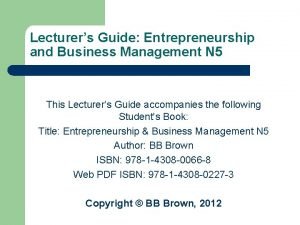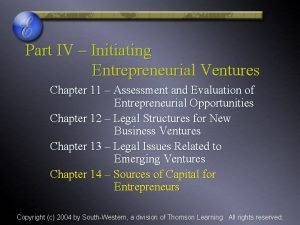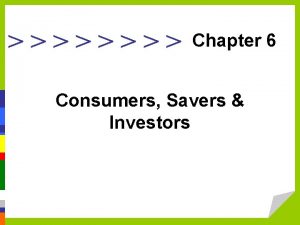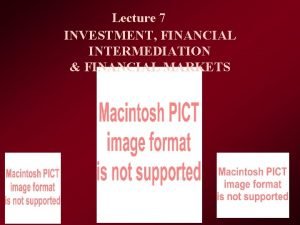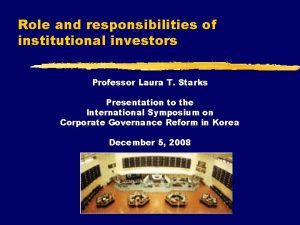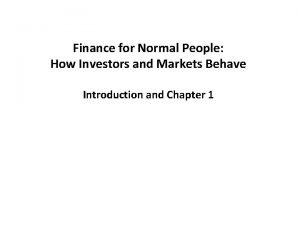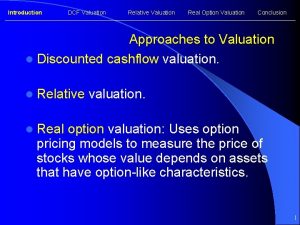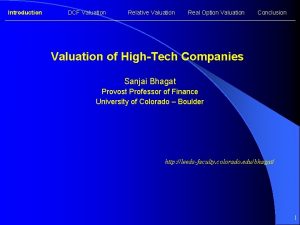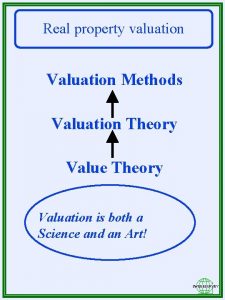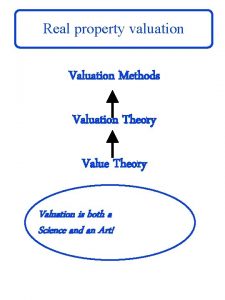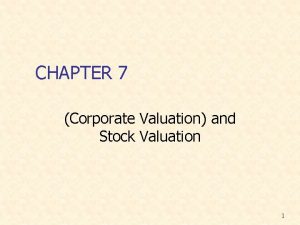Corporate Valuation A Guide for Managers and Investors











- Slides: 11

Corporate Valuation: A Guide for Managers and Investors Phillip R. Daves Michael C. Ehrhardt Ronald E. Shrieves University of Tennessee (c) 2004 DES Chapter 1 1

Chapter 1: Why Corporate Valuation? You make financial decisions every day Investors—buy and sell decisions l Managers—implement operating decisions l Financial staff—evaluate acquisitions l Success or failure depends on whether you correctly identify value DES Chapter 1 2

Goals Provide investors and managers with the basic knowledge to value a company Use free cash flow valuation Use non-proprietary Excel model Online data sources—plus Thomson ONE-Business School Edition DES Chapter 1 3

How you might use this model Investors use it to identify undervalued stocks Investors use it to asses fund manager performance Managers use it to make better business decisions Managers and investors perform scenario analysis DES Chapter 1 4

Our plan of attack Finance requires a circular approach: you need to know finance in order to do financial analysis. You need to know how to do financial analysis to understand finance. Book approaches it simply and slowly increases the level of detail. DES Chapter 1 5

Outline Chapter 2—complete outline, apply to simple company, MPR Chapters 3, 4—More advanced skills, more complicated company, ACME Chapters 5 -8—Still more advanced skills, more complicated company, Van Leer, Inc. DES Chapter 1 6

Outline… Chapters 9 -13—Home Depot valuation DES Chapter 1 7

Discounted Cash Flow (DCF) DCF analysis is at the heart of valuation Basic concepts Present value l Discount rate– Weighted Average Cost of Capital (WACC) l Free cash flows (FCF) l DES Chapter 1 8

Present Value Present value = $1/(1 + r) l If r = 9%, PV = $1/(1. 09) = $0. 917 A dollar to be received in 1 year is worth 91. 7 cents today if the discount rate is 9 percent. DES Chapter 1 9

WACC and FCF WACC is the rate of return on average that all of a company’s investors must earn to be satisfied FCF is the amount of cash flow available for distribution to all of firm’s investors (debtholders and shareholders) after making investments necessary to support growth plans. DES Chapter 1 10

Do I have to become an accountant? NO! But accounting helps, so the book teaches some accounting skills. You will also learn some Excel skills, and how to use online sources of data, including Thomson ONE-Business School Edition. DES Chapter 1 11
 Valuation theories of fixed income securities
Valuation theories of fixed income securities Corporate valuation model
Corporate valuation model Objective of corporate finance
Objective of corporate finance Future managers lecturers guide
Future managers lecturers guide Pros and cons of angel investors
Pros and cons of angel investors Chapter 6 consumers, savers, and investors answer key
Chapter 6 consumers, savers, and investors answer key Capital markets and financial intermediation
Capital markets and financial intermediation Roles and importance of institutional investors
Roles and importance of institutional investors Protecting consumers savers and investors examples
Protecting consumers savers and investors examples Finance for normal people: how investors and markets behave
Finance for normal people: how investors and markets behave Sibwork
Sibwork Monash investors
Monash investors


